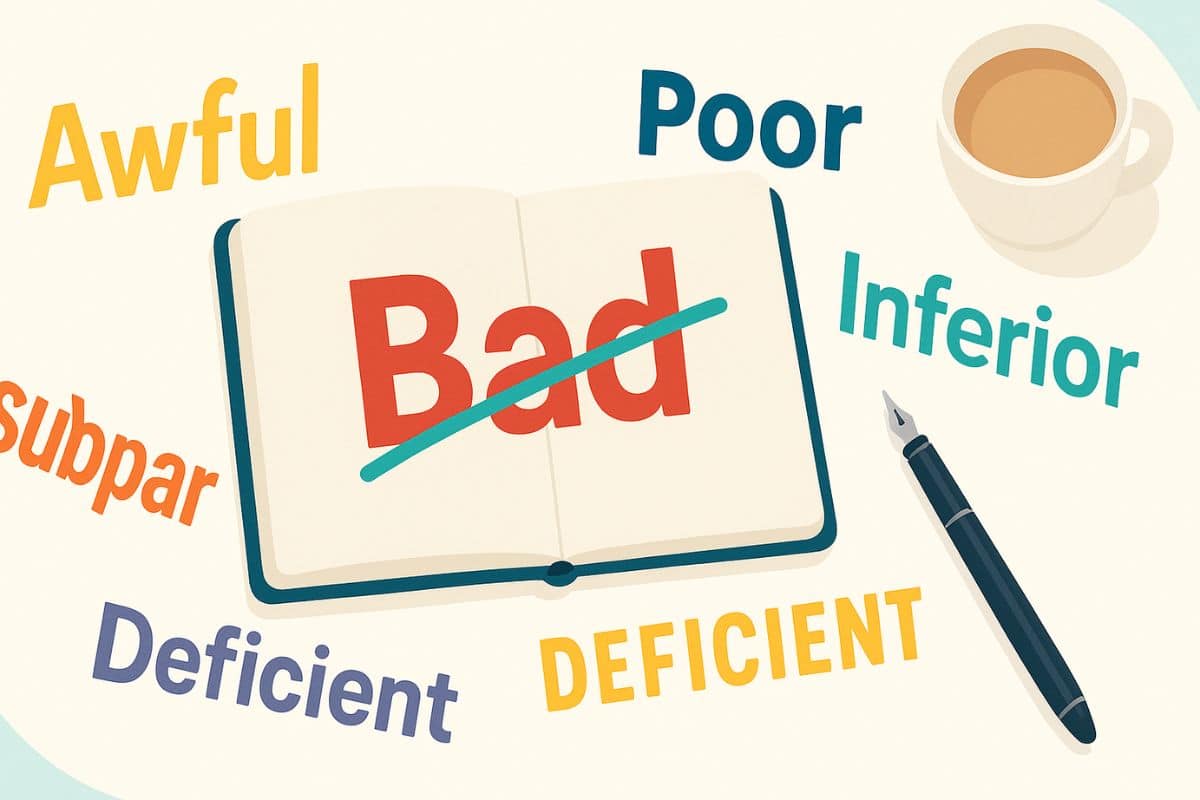There’s such a thing as a bad synonym, in cases where you flippantly use the word “bad”.
The word “bad” is one of the most commonly used negative adjectives in everyday language. This overuse makes you come off as unimaginative.
Hence, saying something is “bad” can feel uninspired, simplistic, and fail to capture the true feelings you wish to express.
In this regard, you might have a limited vocabulary.
Not to worry as the English language offers rich alternatives that can add precision, nuance, and impact to your communication.
Therefore, before writing that important email, descriptive essay, or taking the podium for your speech, you need to start replacing “bad” with better alternatives to improve your message.
In this guide, you’ll find a depth of better words to capture a feel bad synonym instead of a bland “bad” adjective that just doesn’t quite cut it.
Why “Bad” Isn’t Always the Best Choice
Perhaps you’re wondering why “bad” isn’t enough to capture your disdain.
It’s quite simple. A bad synonym is good when you’re describing or giving a bad behavior synonym to a child.
However, it’s not the best choice in weightier conversations with a friend, boss, colleague, in an essay or an interview you’ve prepped hard for.


Never Worry About AI Detecting Your Texts Again. Undetectable AI Can Help You:
- Make your AI assisted writing appear human-like.
- Bypass all major AI detection tools with just one click.
- Use AI safely and confidently in school and work.
The word “bad” seems convenient to anyone having a good command of their language. “Bad” is a quick, all-purpose descriptor for anything negative and quite mundane.
However, this simplicity comes at a cost to you, most especially.
When you default to using “bad,” you sacrifice precision and even grandeur when trying to convey something impactful in your communication.
In this light, “bad” gives only a vague impression rather than a clear picture of what you’re trying to express.
Perchance you have a friend describing a fatal accident, and at every turn in the conversation, they’re describing ghastly events with the adjective “bad.”
If you’ve taken note, we’ve used a number of synonyms for bad in this paragraph, and this has vastly improved the explanation.
Consider this instance with a friend or as a writer trying to write a dialogue between your characters.
So, is the meal actually unpalatable, or merely disappointing? Is the movie truly terrible, or just predictable? Is the situation genuinely harmful, or merely inconvenient?
In such a scenario, would “bad” have conveyed the same impact as the other synonym for bad used?
Using “bad” can also signal intellectual laziness to your audience and readers.
In professional contexts, academic writing, or persuasive communication, this linguistic shortcut may undermine your credibility.
It suggests you haven’t taken the time to identify exactly what makes something unsatisfactory.
Perhaps, “bad” has become so overused that it has lost much of its punch.
When everything from a mild inconvenience to a catastrophic failure is labeled “bad,” the word becomes diluted and ineffective.
Your supervisor or audience may not grasp the true intensity of your meaning when you rely on this worn-out descriptor.
To save you the trouble of searching far and wide for a synonym for bad when writing that essay, use our AI Chat to get instant synonym suggestions that’ll fit your write up based on tone and context.
- Once you get to the AI Chat, type in a detailed prompt, explaining the context in which you need the synonyms for bad, as well as the tone.
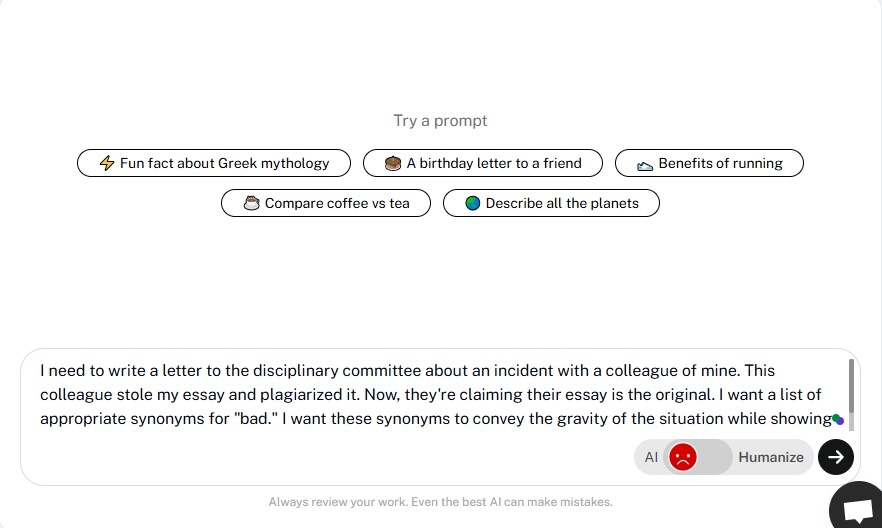
- The AI would provide you with a list of acceptable bad synonyms to use. You can indicate the number of bad synonyms that you want. Thus, tweak the prompt as needed.
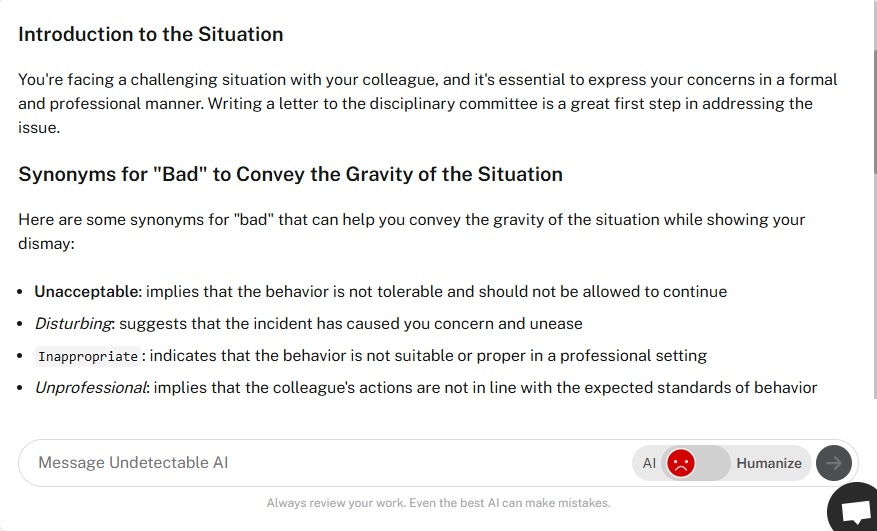
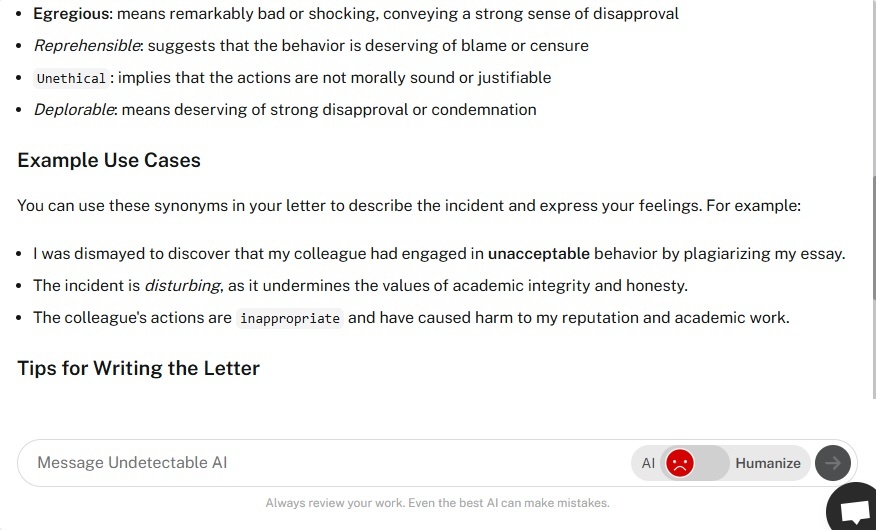
- On the other hand, you can give the AI a text you’ve written that overwhelmingly has the bad synonym. Ask it to correct this with the right synonym to improve the text.
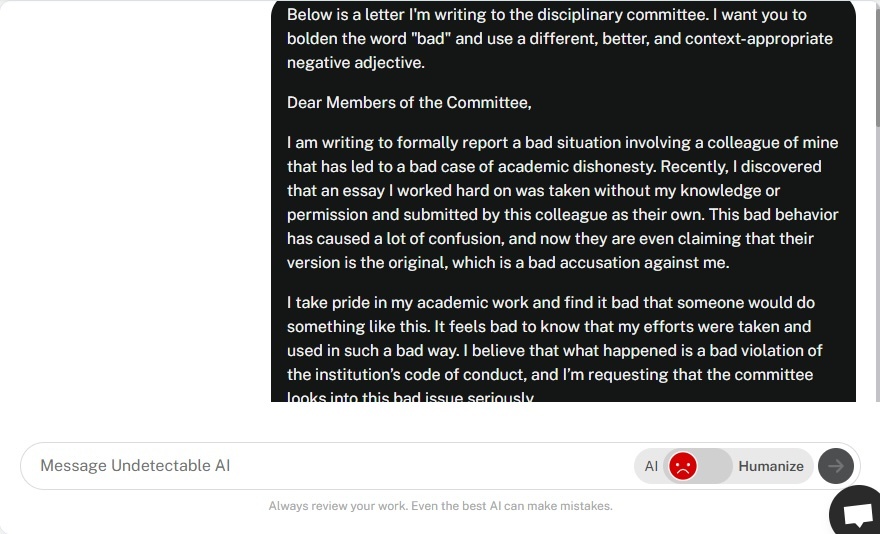
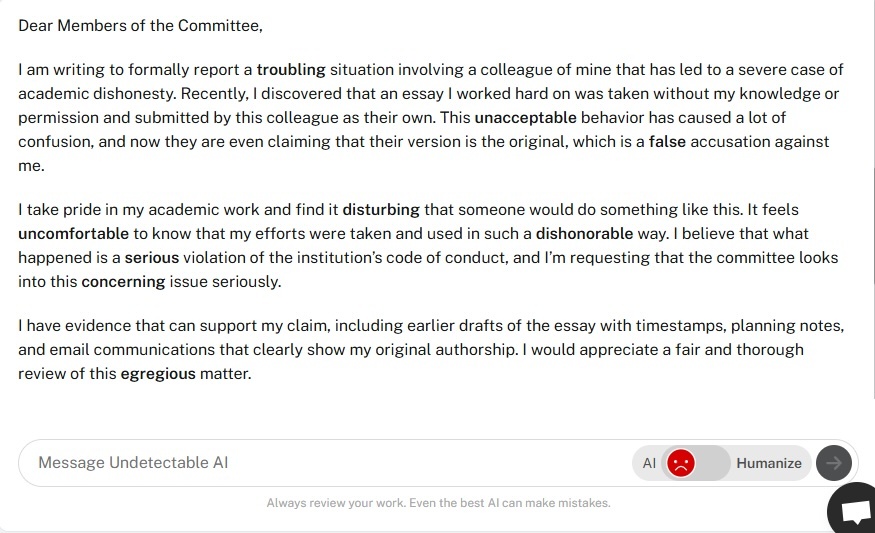
Common Synonyms For “Bad” (and When to Use Them)
In the course of searching for a synonym for bad, it’s best to start from common ones and learn when to use them.
By doing this, you’ll effectively use these bad synonyms when appropriate to convey the exact idea you have in mind.
Also note that a synonym for bad has range and intensity, as we’ll demonstrate below.
Slang & Informal Alternatives for “Bad”
When you’re keeping it casual or in creative writing, these slang or conversational swaps offer a fun and casual way to express a bad synonym, often with a cultural or social emphasis.
| Slang/Informal Alternatives | Use | Example |
| Lame | Use it when something’s uncool, disappointing, or weak. | That party was so lame, we left early. |
| Trash / Trashy | Great for calling out poor quality or behavior. | This movie was complete trash. |
| Crappy | Slightly vulgar but common in informal talk. | I had a crappy day at work. |
| Whack | Popular in urban slang, often means strange, unjust, or low-quality. | His excuse was whack. There’s no way I’m buying it. |
| Bogus | Great for calling out fakes or lies. | She gave me some bogus excuse for missing the meeting. |
| Wretched | For extremely unpleasant experiences | I had a wretched flight with turbulence the entire six hours. |
| Suck | Informal and expressive, used when something is generally disappointing. | This day sucks, Sis. |
| Sketchy | Perfect when referring to something suspicious or untrustworthy. | That alley looked sketchy at night. |
| Crummy | For things of poor and icky quality | They put us in a crummy hotel room with peeling wallpaper and a broken TV. |
| Lousy | For disappointing experiences, excuses and actions. | We got lousy service at that restaurant; the waiter forgot our order twice. |
| Epic fail | For a complete disaster, zero redeeming qualities. | The product launch was just an epic fail from start to finish |
| Hot mess | When things are wildly disorganized or spiraling, but with a weirdly entertaining twist. | She was a hot mess in heels as she gave her impromptu presentation in class, stammering. |
| Train wreck | Painful to watch, impossible to ignore. | The reunion show was an absolute train wreck before it began. |
Academic Alternatives: Stronger Words for Essays
In essays and formal writing, precision and strength matter for you to effectively convey your point and add nuance.
These precise alternatives can improve your repertoire of good and bad synonym in academic writing.
| Academic Alternatives | Use | Example |
| Detrimental | When something causes harm | The policy proved detrimental to small business growth in the region. |
| Adverse | For harmful or unfavorable situations | Our researchers noted adverse reactions in 12% of study participants. |
| Suboptimal | When something is below the best possible outcome | The algorithm produces suboptimal results when processing outlier data. |
| Defective | For things with flaws that impair function | The manufacturer recalled 10,000 units of the defective product. |
| Pernicious | For subtly harmful influences | The study exposed the pernicious influence of confirmation bias in cults. |
| Reprehensible | For morally objectionable behavior | The ethics committee condemned the corporation’s reprehensible environmental practices. |
| Deleterious | For gradually harmful influences | Prolonged stress and lack of sleep have deleterious effects on cardiovascular health. |
| Inefficacious | When something fails to produce desired results | Chemotherapy has proved inefficacious for patients with advanced stages of cancer. |
| Egregious | For shockingly bad actions | The paper contained egregious methodological errors that invalidated its conclusions. |
| Counterproductive | For actions that achieve the opposite of what’s intended | Excessive focus on standardized testing has been counterproductive to developing critical thinking skills. |
| Flawed | Highlights specific issues in reasoning, design, or argument. | The researcher’s logic is fundamentally flawed in this section. |
| Problematic | Neutral tone, good for pointing out flaws without being too harsh. | This approach will prove to be problematic in large-scale implementations. |
| Inadequate | Suggests something isn’t enough or up to standard. | The company’s safety measures were inadequate. |
| Unsatisfactory | This indicates failure to meet expectations. | Your proposal has been reviewed by this panel and we found it unsatisfactory. |
Use Better Words in Your Essay
Writing an essay, whatever the nature of the topic, is quite taxing as you have to use advanced vocabulary, descriptions, and structure to capture and convey your ideas.
Your reader, professor and academic journal would demand this of you.
Consequently, using “bad” and simple words would be subpar and get your essay thrown out before careful consideration.
With this at the forefront of your mind, you certainly want to elevate your vocabulary to demonstrate your command of the language and also sharpen the clarity of your argumentative essay and analytical work.
On that account, well-chosen alternatives to “bad” can transform your mediocre essay into a compelling academic work.
That being the case, consider how “detrimental economic policies” carry more weight and specificity than “bad economic policies,” or how describing a line of thought as “fundamentally flawed” rather than simply “bad.”
This pinpoints the nature of the criticism and helps you sound like you know what you’re talking about.
Lending credence to what you say, better and advanced words will allow you to communicate complex ideas with greater accuracy and persuasiveness.
You’ll discover that sophisticated vocabulary choices increase your standing with professors and peers to show that you’ve engaged deeply with your subject matter.
When you describe an argument as “specious” rather than “bad,” you demonstrate not just that you disagree with it, but that you understand exactly why it fails to convince.
Similarly, characterizing evidence as “inconclusive” rather than “bad” shows nuanced analytical thinking about the limitations of data.
In addition, you must have seen or heard people say academic writing is laden with “big words.”
While that’s true, the nature of this writing often requires the writers to evaluate complex phenomena, historical events, literary techniques, and scientific processes where simple descriptors fall short.
You will discover that as you begin to write varied essays on different topics, a thoughtful vocabulary enables you to differentiate between various types of problematic elements.
Thus, policies might be “counterproductive,” theories “unsupported,” interpretations “reductive,” or methodologies “biased.” Anyone reading your work would better understand you.
Nevertheless, to achieve this mastery over better words to use in your essay is not easy, especially if you’re new to this or short of ideas.
Strengthening your vocabulary and wording your essay is ultimately a long and taxing process, but this can be simplified for you.
Struggling with essay wording?
Try our AI Essay Writer to instantly upgrade your vocabulary and structure like a pro.
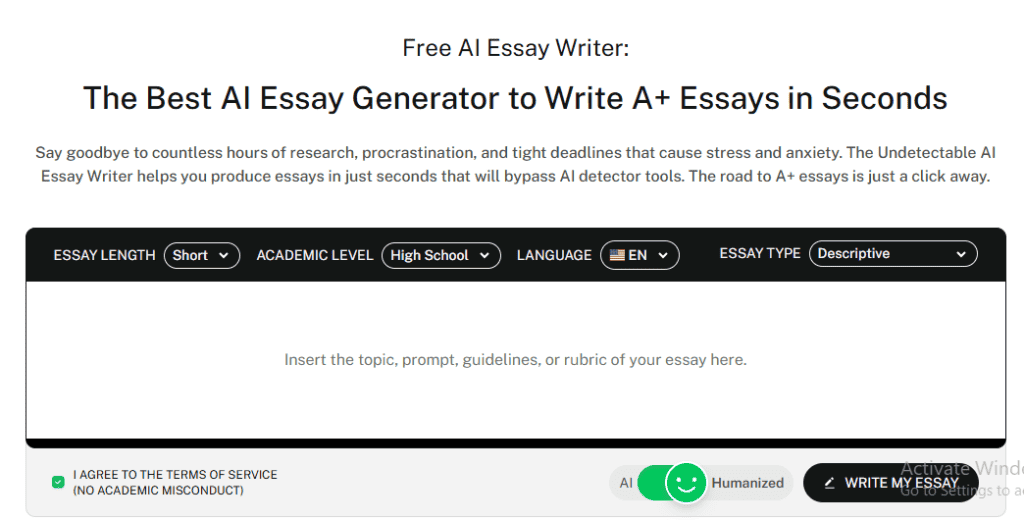
Exercises: Swap “Bad” for Better Words
A fantastic way to start training yourself to improve your usage of “bad” would be to do exercises that would push you on the path of swapping the bad synonym for better words.
For this purpose, look no further than our AI Chat.
All you need to do is ask AI Chat to build you a personalized synonym bank for your writing goals.
Suppose you’re an author, professor, scientist, data analyst, consultant, or any other professional, you let the AI know this and on what topic you’re writing.
With adequate information on your writing goals, our AI chat would build you an accessible good and bad synonym bank that you can refer to when writing.
Don’t leave without exploring our AI Detector and Humanizer in the widget below!
FAQs
Is There An Absolute Bad Synonym?
No, there isn’t an absolute synonym for “bad.” that works interchangeably in all contexts. The word “bad” is super broad.
It can mean morally wrong, poor in quality, unpleasant, harmful, and that’s just scratching the surface.
So, depending on what you’re trying to say, it’s better to find the “right” synonym.
What Bad Behavior Synonym Is Best to Use For a Child?
When trying to describe a child’s bad behavior, you should address the issue without calling the child bad outright.
Thus, depending on their conduct and activity, you can use naughty, unruly, disobedient, mischievous, and rowdy, just to mention a few.
Final Thoughts
Using a bad synonym is only as good as the context in which you’re using it.
Before searching for a synonym for bad, consider if the context is informal or academic.
From there, choose the appropriate synonym and convey the precise thought and description you have in mind.
If this proves to be a problem, use our AI Chat to simplify your brainstorming process.
All in all, learn to use better words in your essays and exercise your vocabulary to come off knowledgeable.
Want your writing to sound sharp, natural, and undetectably human?
Try Undetectable AI to refine word choice and elevate your writing instantly.
